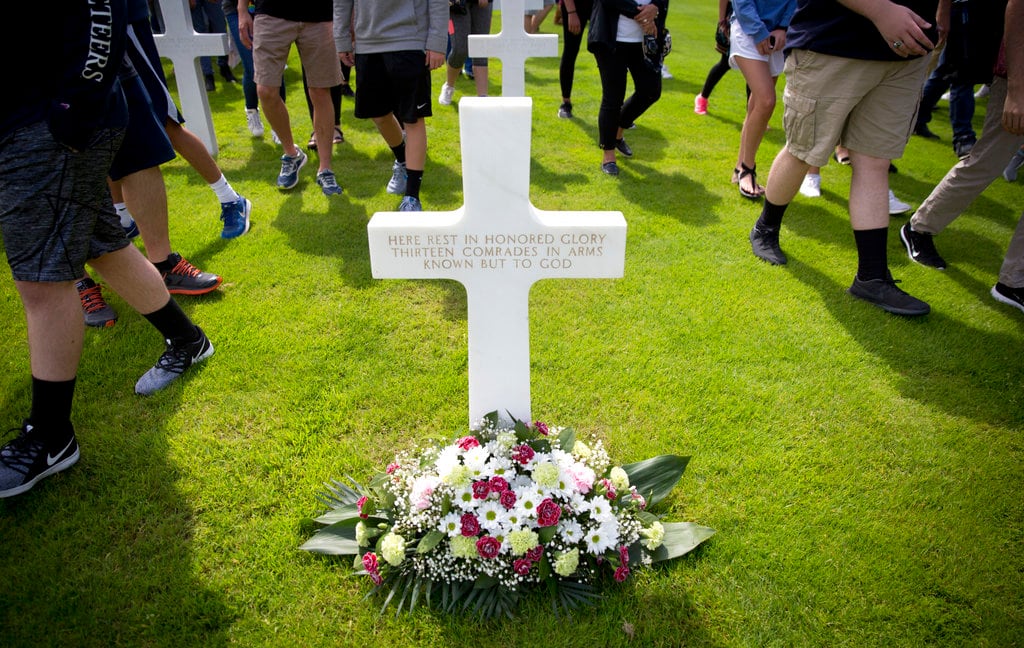The commander of the Florida National Guard on Tuesday promised more action on the problem of sexual assault and harassment in the wake of a burgeoning scandal he inherited, which involves allegations of sexual misconduct covered up for years by leadership.
“In April, just as I was taking command, our organization was rocked by public allegations of misconduct that went all the way up our chain of command to the highest levels,” Air Force Maj. Gen. James O. Eifert, the Florida National Guard adjutant general, said in a message to troops posted on his Facebook page.
“Over the past seven months, we have received more than 60 allegations — some extremely serious — ranging from misuse of government resources to retaliation to sexual assault. Needless to say, it has been a challenging few months, and the fallout from these allegations has not left our organization unscathed.”
The allegations are against one or two individuals, said Army Maj. Caitlin Brown, a Guard spokeswoman. She declined to provide names, saying some details will be released around the end of the year.
Eifert’s actions came after the Tampa Bay Times reported in March that the Guard — about 12,000 soldiers and airmen who deploy to combat zones and help at home in natural disasters — was facing ongoing investigations into allegations of sexual misconduct and coverups that date back a decade. That report led the Guard’s second in command, who was among those accused of both committing and covering up sexual improprieties, to resign.
In a statement to Military Times, which first reported the resignation, Army Brig. Gen. Michael Canzoneri denied wrongdoing.
“I maintain my innocence in the allegations,” he said Wednesday afternoon.
In May, he told Military Times he was resigning because “the investigation is a distraction to the force, our soldiers have a mission. So in order to support our soldiers, I have chosen to step down.”
In his Facebook message, Eifert said that in the case of the accusations revealed in the Tampa Bay Times story, “I can personally assure you that every single one of them was elevated and investigated by the appropriate agency, with some of these investigations still ongoing.”
While he offered no details on the outcomes, Eifert urged his troops to understand that silence from the command does not equal inaction. Several factors, including privacy regulations, have limited his ability to communicate what is going on, Eifert wrote.
“I am addressing this directly so that you don’t mistake silence for a conspiracy or cover-up,” he wrote. “While we can release the results of trials or other legal proceedings (such as courts-martial), the regulations forbid us from discussing certain specific aspects of adverse administrative actions, up to and including non-judicial punishment and discharge boards — even after they are completed. Given all these limitations, it can be extremely difficult for the command to convey to the force that misconduct has been dealt with appropriately. “
Some of the allegations against Canzoneri were detailed in an email to a state lawmaker from south Florida written by Maj. Elliot Potter, a Tampa-based officer in the Florida National Guard Judge Advocate General’s Corps. Potter researched the allegations and forwarded them to his superiors. A copy of his email was obtained by the Tampa Bay Times.
According to Potter, Canzoneri and another officer “have actively concealed evidence of sexual misconduct and other violence committed against soldiers of the Florida National Guard.”
Potter sent his email to state Sen. Lauren Book, a Florida Democrat, who told Gov. Ron DeSantis in a Jan. 16 letter that she was “inclined to believe” Potter. Investigations are underway at both the state and federal level, Book spokeswoman Claire VanSusteren told the Tampa Bay Times in March.
In a statement to the Tampa Bay Times in March, outgoing commander Maj. Gen. Michael Calhoun, 65, declined to comment on specifics of any investigation but said, “We are deeply troubled by these allegations.”
The Tampa Bay Times reported that among the people whose complaints fueled the investigations is Shira Callahan, a 46-year-old former civilian contractor for the Guard who filed sworn statements with the Guard Inspector General’s Office. Callahan alleged a pattern of sexual misconduct and other wrongdoing by Guard soldiers and leaders.
She said in an October 2017 sworn statement that Canzoneri, 56, came up to her during a break in a 2011 conference and “slowly ran his hand from one side of my bare shoulder to the other.”
She also said Canzoneri made sexual gestures to a female bartender during the same conference and ended a two-year affair he had with a female soldier. He then allegedly transferred the soldier after she refused to have sex with his friends.
Callahan also accused Canzoneri of covering up for another officer she named in her complaints: Lt. Col. Scott L. Taylor.
As a result of Callahan’s allegations, Taylor was found to have “created an intimidating, hostile or offensive work environment” for her, according to a September 2017 letter from Army Col. Leslie F. Caballero, inspector general with the Florida National Guard.
Caballero called it “conduct that brings discredit to the Florida National Guard.”
Those findings, signed off on by Calhoun, also included recommendations for changes in policies. They include ensuring that everyone considered for key positions is thoroughly screened and that personnel pass along information to commanders about “problem soldiers.”
As of May, the investigation into Taylor was ongoing, Brown told Military Times at the time.
In an interview with the Tampa Bay Times, Taylor vociferously denied allegations against him. He did not immediately respond to a request for comment made through the Guard Friday.
Eifert in his statement wrote that the ongoing fallout from the investigations requires transparency on the part of his command.
“Bottom line, we are not sweeping anything under the rug,” Eifert wrote. “I believe deeply in transparency and accountability, and know that both of these attributes are cornerstones of an effective, cohesive organization."
To get a better handle on the problems, the Guard recently conducted a force-wide climate survey on sexual harassment and sexual assault, Eifert wrote, with a little more than 10 percent of the force participating.
The responses “highlighted several strengths with regards to how we handle these issues in our formations, as well as a few things we need to work on,” Eifert wrote, without offering specifics.
The Commander’s Ready and Resilient Council has brought together a group of helping professionals who are currently creating a comprehensive action plan to address the issues identified, wrote Eifert, adding, “In the next few months “we will begin publishing a Privacy Act-compliant ‘Status of Discipline’ briefing for distribution to the entire force.”
A recurring publication, it will look back at six-month intervals “and publicize, for all to see, what actions command has taken in response to misconduct in our organization,” he wrote. “This transparency should close the loop on the adjudications of disciplinary actions and educate our members on expectations of the command’s exercise of authority.”
Howard Altman is an award-winning editor and reporter who was previously the military reporter for the Tampa Bay Times and before that the Tampa Tribune, where he covered USCENTCOM, USSOCOM and SOF writ large among many other topics.





